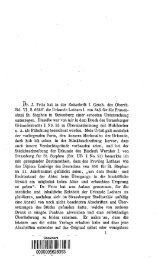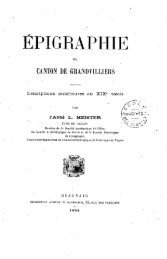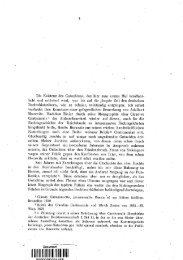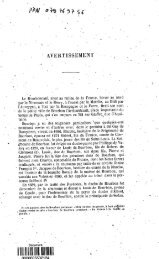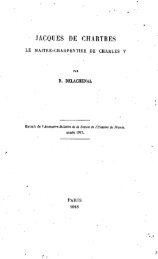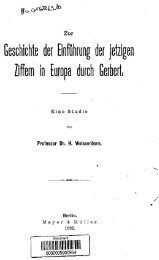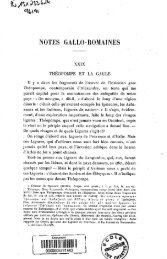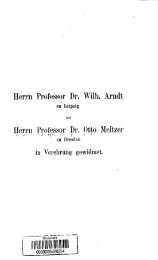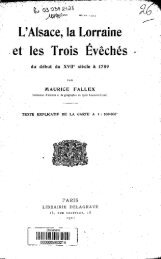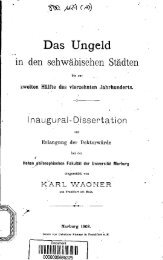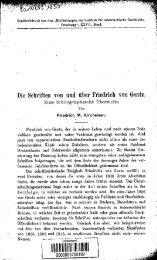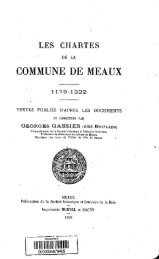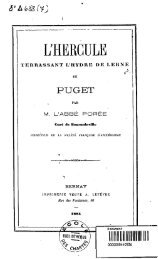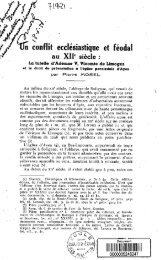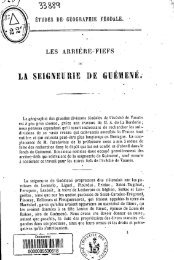4P Li gç(' TRANSACTIONS
4P Li gç(' TRANSACTIONS
4P Li gç(' TRANSACTIONS
You also want an ePaper? Increase the reach of your titles
YUMPU automatically turns print PDFs into web optimized ePapers that Google loves.
VOL. 47, PT. 5, 19571 ORESMES VERSION AND ENGLISH TRANSLATION 839<br />
G. Et est ce que l'cn appelle en latin timor fihialis, limor<br />
castus. Creinte filial est chaste. lit par tele paoUr doubtent<br />
Dieu les angclz et les sains, Si comme dit l'Escripture<br />
Timebunt angeli.<br />
T. Mes une autre espece de creinte est oveques haine<br />
et inimisté, Si comme les serfs ont oveques leur seigneurs<br />
et les citoiens as tyrans injurieus et iniqtieS.<br />
G. II entent des sers qui stint en servitude par violence<br />
et contre leur volenté et ]cur nature. Et ceste paour ou<br />
creinte est appellee servile: Timor servilis. Et ainsi les<br />
dyables creingnent Nostre Seigneur: Deniones credunt et<br />
tremunt. lit donques le mari doit faire a son povoir que<br />
sa femme Ic doubte scion Ia premiere espece de creinte ou<br />
de paour. Apres it met tin autre enseignement, qui est<br />
aussi conmie conclusion des dessus mis.<br />
T. Item, de toutes ces choses it doit eslire les melleurs<br />
et faire (jUC sa femme soit concordabie et ioiaie et<br />
propre a lui.<br />
G. Concordabic en volenté loiale en operation, propre<br />
sans cc qu'elle aime autre charnelnient.<br />
T. Afin ciu'eiie ne use pas moms de bonne operation<br />
mi present et lui non present, mes face tousjours aussi<br />
comme // (345a) se it estoit present. Et qu'ii et elle<br />
soient aussi comme curateurs et gardes des choses communes<br />
de l'ostel. Et quant i'liotume est absent que sa<br />
femme sente et apperceve que nul tie est meileur 1 a cue<br />
ne plus moderé ne plus propre nine son man.<br />
G. Nut meileur en lui faisant bien, tie plus moderé en<br />
la traictant benignement, ne plus propre sans traire soy<br />
vers autre. Et donques Ic mari la doit gouverner telement<br />
et faire tant a son povoir queue ait ceste opinion.<br />
T. Et qu'il monstre ceste chose an commencement<br />
en resgardant tousjours au bien commun de l'ostel,<br />
combien (ltl'elle soit novice et peu sachante en teles<br />
choses.<br />
C. Scion tine exposition, it veuit dire que Ic mari dolt<br />
enseigner la femme au commencement Ct scion une autre<br />
exposition, it veult dire quc la femme doit monstrer soy<br />
estre tele comnie dit est.-`<br />
T. Item, se le homme a domination mesmement a<br />
Soy....<br />
G. Ce est a dire, quil soit scigneur de soy en repriniant<br />
ses concupiscences et ses ires et en regulant ses faiz par<br />
raison.<br />
T. II sera bon recteur ou gouverneur de toute la vie<br />
domestique et enseignera a la femnie user de teles<br />
choses.<br />
C. Car quant Ic seigneur de i'ostel, qui est niaistre,<br />
gouverneur et example a tous, est bon scion soy, chescun,<br />
et femme et enfans et servans en doit miex valoir. Mes<br />
scion une autre exposition, qui ne semble pas si propre<br />
parce que ii (lit Si ipse sibi inaxime dotninetur, it entent<br />
que Ic mari soit bien seigneur de sa fenime. Or avons<br />
donqucs en cest chapitre .vi. enseignemens pour faire la<br />
feninie bonne.3<br />
C. This is what is expressed by the Latin timor flliali.r,<br />
tinior cast us: filial fear is chaste. And with this kind of<br />
awe the angels and saints fear God; as the Scripture says:<br />
"The angels shall be afraid" [Job 41: 16].<br />
T. But another kind of awe is accompanied by hatred<br />
and hostility, such as slaves feel for their masters and<br />
citizens towards despotic and evil tyrants.<br />
C. By slaves he means those who are such by violence<br />
and against their will and contrary to their nature. And<br />
this kind of fear or awe is called servile: timor servilis.<br />
lit manner the devils fear our Lord: "The demons<br />
believe and tremble" [James 2: 19]. Therefore, the husband<br />
must try that his wife should fear him with the firstmentioned<br />
kind of awe or fear. Next he states another<br />
precept, which is in the nature of a conclusion to the<br />
previous ones.<br />
T. Thus the husband should choose the best of all<br />
these possible alternatives and see to it that his wife<br />
should be in harmony with him, loyal and devoted to<br />
him alone.<br />
C. Harmonious in her will, loyal in action, and devoted<br />
to the exclusion of any other carnal love.<br />
T. So that whether he is present or absent, she will<br />
act equally well, behaving herself exactly /,/ (345a) as<br />
though lie were present. And they should both be caretakers<br />
and watch over their common interests in the<br />
household. And when the husband is away, she should<br />
feel and perceive that no other man is kinder to her or<br />
more considerate or more completely hers than her own<br />
husband.<br />
G. No one better in goodness to her or more considerate<br />
in treating her kindly or more completely her own without<br />
turning to other women. Thus the husband should govern<br />
his wife in such manner and seek in every possible way<br />
that she hold this opinion of him.<br />
T. Let him show this concern from the very beginning,<br />
looking always to the common welfare of the<br />
household even though she be a novice and know little<br />
of such matters.<br />
G. According to one exposition, he means that the husband<br />
should teach the wife at the beginning, and another<br />
expositor says he means that the wife should show herself<br />
to be concerned as indicated above.<br />
T. And if the husband is indeed master of himself.<br />
C. That is, if he masters his lusts and his angry passions<br />
and governs his acts by reason.<br />
T. He will be a good teacher or governor of the<br />
domestic life and will guide his wife to use the same<br />
measures.<br />
C. Because when the master of the household, who is<br />
the director, governor, and the example for all within the<br />
estate, is himself a good man, then each member—wife,<br />
children, and servants—must be more worthy likewise. But<br />
according to another reading, which does not seem to me<br />
so correct because it says: If the husband learns first of all<br />
to control himself, he means that the husband should be a<br />
good master to his wife. We now have in this chapter six<br />
precepts dealing with the training of the good wife.



